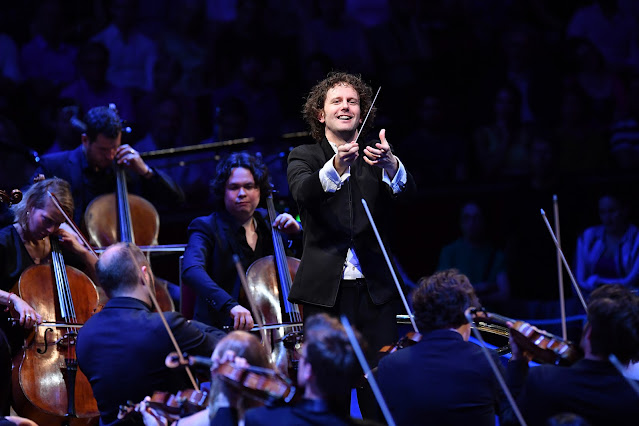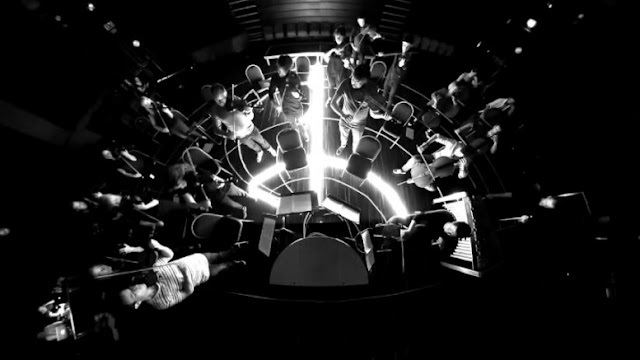 |
| Nicholas Collon and the Aurora Orchestra (Photo Chris Christodoulou) |
The Aurora Orchestra has a new disc out, the ensemble's first one on Deutsche Grammophon. Conducted by artistic director Nicholas Collon, the disc is entitled Music of the Spheres, and features Mozart's Jupiter Symphony, Max Richter's Journey, and Thomas Adès' Violin Concerto 'Concentric Paths' with violinist Pekka Kuusisto, alongside music by David Bowie and Nico Muhly's arrangement of John Dowland.
Max Richter's Journey was commissioned specially for the project and is inspired by the discovery of the first pulsar stars [you can see an excerpt on Richter's website], whilst Mozart's symphony was performed from memory, something for which the orchestra has become well known. I recently chatted to Nicholas Collon, via Zoom, to find out more.
The programme arose after the orchestra had played Mozart's Jupiter Symphony at the BBC Proms in 2017 and had loved it. The result is a varied mix of works inspired by the theme of the music of the spheres ['an ancient philosophical concept that regards proportions in the movements of celestial bodies—the Sun, Moon, and planets—as a form of music. This "music" is not thought to be audible, but rather a harmonic, mathematical or religious concept' - Wikipedia]. Nicholas admits that the link to Mozart's symphony touches the programme only tangentially ('Jupiter' is a nickname applied to the symphony after Mozart's death), but the result is the sort of varied repertoire which the ensemble enjoys. [See Nick Boston's review on Bachtrack of the orchestra's Music of the Spheres programme at the Queen Elizabeth Hall, 5 June 2019]
 |
| Aurora Orchestra performing Max Richter's Journey |
The Mozart symphony was recorded from memory partly because the orchestra was playing it like that in concert, and having played it from memory two days before the recording sessions, Nicholas feels that it would have been strange to put the music back. He certainly found a difference, playing from memory brought an intensity into the room at the time of recording, and he hopes that this frisson comes through on the recording. Certainly he thinks the result is freer and looser than it might have been if they were using music, but ultimately it is for the listener to decide.
The orchestra has been performing music from memory since 2014. It started because they performed a Benedict Mason piece, Meld which called for the players to be distributed all around the Royal Albert Hall, and they decided that the best way to achieve what the composer wanted was to play it from memory. So they looked for another work as a companion, also to be performed from memory and chose Mozart's Symphony No. 40. The response from both audience and players was very positive and this formed a jumping off point for all sorts of other performances from memory.
How difficult a work is to memorise, Nicholas thinks varies from work to work, and also depends on the instrument parts to some extent. But there is no magic to it, just hours of work; and he points out that opera singers are expected to memorise hours of music. So the orchestra has successfully performed Berlioz' Symphony Fantastique and Shostakovich's Symphony No 9, but it was a lot of work.
 |
| Nicholas Collon and the Aurora Orchestra in their Music of the Spheres programme (Photo Nick Rutter) |
Nicolas also adores Thomas Ades' music and regards the Violin Concerto 'Concentric Paths' as one of the great concertos of the last 75 years [The work was commissioned by the Berliner Festspiele and the Los Angeles Philharmonic, and first performed by Anthony Marwood, the Chamber Orchestra of Europe and Thomas Adès on 4 September 2005 in the Kammermusiksaal at the Berliner Festspiele]. Nicholas refers to the work's combination of virtuosity and aesthetic beauty, and describes to me in detail a magical moment in the slow movement of the work. In its combination of complex music and interesting emotions, the work explores themes which relate to how Nicholas thinks about music. Nicholas performed the work with Pekka Kuusisto and the Philharmonia Orchestra around six years ago, and then more recently the two performed it with the Aurora Orchestra.
Before lockdown, the orchestra had been planning to release
its archive; they are lucky to have lots of archive content. For
lockdown, this was developed as Aurora Play, with a wide variety of full
length concerts on YouTube, and the BBC has been very accommodating in
this. But they have also brought in an animateur Jessie Maryon-Davies to create a
Join in with Jessie thread which has included dancing to
Beethoven and to Berlioz, or drawing; using a variety of ways to get
people to join in with the music.
Nicholas and the orchestra want each concert, whatever the repertoire, to be as musically uplifting as possible. And this includes finding ways of emotionally extending the music, so that Berlioz' Symphonie Fantastique had a theatrical staging, and this Orchestral Theatre can involve collaboration with other art forms. The integrity of the music always comes first, and Nicholas hopes that they never relinquish this, but the presentations, particularly with music that is memorised, give the orchestra a chance to enhance the music.
 |
| Pekka Kuusisto, Nicholas Collon and the Aurora Orchestra (Photo Nick Rutter) |
Nicholas feels that their eclectic programming deliberately goes against the grain of the very manufactured sense of an orchestral programme from the last 100 years. He points out that pre-1920, orchestral concerts were 'batty' with odd mixtures of things that would not happen now. If you stop thinking of concert repertoire in one dimension, the result can be rather exhilarating. Nicholas points out that conventionally one might programme Brahms alongside Schoenberg, but that it would be seen as odd to put Stravinsky with Brahms. This assumes that our ears can only cope with one narrative, whereas Aurora Orchestra programmes deliberately go against this grain, and assume we can cope with multiple narrative ideas. This diversity of approach is easier to achieve with a chamber orchestra, with a symphony orchestra you have to deal with larger slabs of musical meat.
 |
| Nicholas Collon (Photo Jim Hinson) |
As it is, Nicholas is taking one week at a time as things have been moving so quickly. But he has been using lockdown to spend more time with his three young children, though this does involve teaching them music and listening to music with them.
Aurora Orchestra and Nicholas Collon on disc:
- Music of the Spheres - Mozart, Richter, Dowland arr Muhly, Adès, Bowie arr Barber - Pekka Kuusisto, Iestyn Davies, Aurora Orchestra, Nicholas Collon - Deutsche Grammophon
- Insomnia - Gurney, Adès, Britten, The Beatles, REM - Allan Clayton, Aurora Orchestra - Warner Classics 2015
- Introit - Ivor Gurney - Amy Dickson, Nicholas Fleury, Thomas Gould, Tom Poster, Aurora Orchestra, Nicholas Collon - DECCA 2015
- Road Trip - Copland, Ives, Adams - Aurora Orchestra, Nicholas Collon - Warner Classics 2014
- Seeing is believing - Nico Muhly - Aurora Orchestra, Nicholas Collon - DECCA 2010
Elsewhere on this blog
- A work usually starts with a conversation: I chat to percussionist Joby Burgess about new repertoire, collaborating with composers and playing during lockdown - interview
- Venice's Fragrance: this delightful disc from Nurial Rial and Artemandoline celebrates the 18th century's love affair with the mandolin - CD review
- A journey over the rainbow: Ailish Tynan & Iain Burnside take us from mature Grieg to Harold Arlen - concert review
- Contemporary re-invention: the String Orchestra of Brooklyn's debut disc features two works which re-invent fragments of classics - CD review
- A picture of a musical collaboration: In Seven Days from Thomas Adès and Kirill Gerstein - CD review
- Richard Wagner's heir, innovative festival director, opera composer, homosexual: the complex tale of Siegfried Wagner - feature article
- An organist in lockdown:
I chat to Edmund Aldhouse, director of music at Ely Cathedral, about
his work, the English romantic organ, & how to keep choristers
motivated without regular services - interview
- Hee-Young Lim: the young Korean cellist in Prokofiev & Rachmaninov cello sonatas on Sony Classical - CD review
- Cultured, well-made songs: The Complete Roger Quilter Songbook from Mark Stone and Stephen Barlow - CD review
- From the pen of the septuagenarian swan: Francisco Valls' Missa Regalis from the Choir of Keble College and the Academy of Ancient Music - CD review
- Early Beethoven, late Faure and Schumann's birthday: Steven Isserlis and Mishka Rushdie Momen at Wigmore Hall - concert review
- 'Home


%20in%20The%20Merry%20Widow.%20Credit%20Mihaela%20Bodlovic.%20(2).jpg)

%20in%20Trial%20by%20Jury.%20Credit%20Mihaela%20Bodlovic..jpg)

.jpg)
%20Britten%20Pears%20Arts%20(1).jpg)



No comments:
Post a Comment